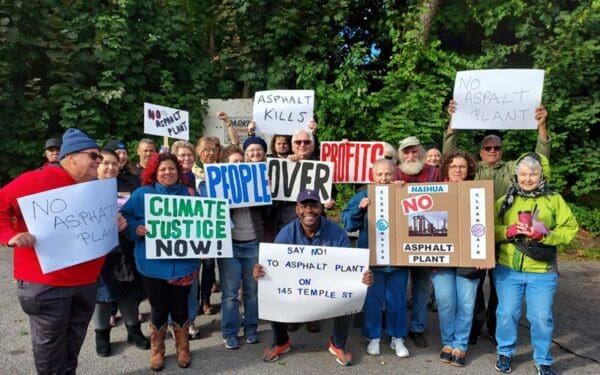
This year's annual United Nations climate conference proved disappointing. With global action stymied, we must be even more vigilant in pushing forward action at the local and state levels. Photo: IStock
Every November since 1995, the United Nations has convened representatives from nearly 200 countries to chart steps in responding to the climate crisis. This year’s delegates to the “Conference of the Parties,” or COP, met in Egypt with earnest rhetoric but little to offer in terms of new commitments or strategies for reducing global emissions or aiding developing nations suffering catastrophic losses from extreme weather and rising seas.
A so-far symbolic win for developing countries was overshadowed by a lack of progress on phasing out fossil fuels globally. At the same time, repression in the host country, energy markets roiled by the Ukraine war, and pervasive corporate influence over the negotiations cast a pall over the proceedings as a whole.
This lack of progress, six years after delegates struck the historic Paris climate agreement at COP21, was, of course, predictable. Professions of alarm and artful agreement drafting are merely performances unless they are backed by leadership and accountability here at home.
Despite earnest rhetoric on climate, fossil fuel interests ruled COP27
Fossil fuels account for most planet-warming emissions. The delegates to COP – and the tens of thousands in attendance to influence them – know we need to phase out dirty energy like coal, gas, and oil in the coming years to avoid the worst impacts of the climate crisis. But with corporate sponsorships and legions of lobbyists, fossil fuel interests were a dominant voice in the COP27 talks, and they succeeded in thwarting any proposals that would meaningfully curb the world’s use of their polluting products.
This is hardly surprising, given that many nations at the negotiating table own or hold an interest in fossil fuel companies. Others (including the United States under President Biden) continue to promote the expansion of oil and gas infrastructure.
The industry’s influence proved fatal to a widely supported proposal that guaranteed a phase-down of fossil fuel use worldwide. Instead, delegates approved a vague promise of fewer fossil fuel subsidies.
A venue for greenwashing
The great triumph at COP27 was national and corporate greenwashing – in which a thin veneer of climate concern veils fealty to fossil fuel interests. This was reflected not only by the dominance of the fossil fuel lobby and oil-producing nations but also by the prominence of one of the conference’s major sponsors: Coca-Cola. The massive beverage company is the largest plastic polluter in the world, making it a major contributor to global climate disruption. Its sponsorship of the climate conference enabled the company to trumpet its climate credentials even as it worked to protect the primacy of fossil fuels and the increasing proliferation of fossil-fuel-based plastics.
President Biden, too, appeared to use COP as cover, waxing eloquent about the need for clean energy while advancing fossil fuel expansion. Touching down in Egypt for less than four hours, Biden announced new support for Egypt’s solar energy program and crowed about recent U.S. legislation to speed the transition to renewable energy, even as his administration was quietly approving plans for the nation’s largest oil export facility off the Gulf Coast of Texas.
Half-a-loaf, or none, for countries facing significant climate losses
Developing nations worldwide already suffer the most from climate fallout, from rising seas to catastrophic flooding to extreme drought. They also have limited resources to adapt and respond. By any measure, emissions from these countries have contributed little to the accelerating pace of climate change. In contrast, the world’s 20 wealthiest nations have produced 80% of the pollution blanketing and warming the planet.
After contentious negotiations, COP27 delegates agreed to create a fund supported by wealthier countries to address this inequity. The fund ostensibly will support cleanup and rebuilding efforts when climate impacts hit vulnerable developing nations.
Whether this is a significant win remains to be seen. The final agreement estimates that developing nations will need over $5 trillion by 2030 to adapt to climate impacts. But there are as yet no commitments as to how much of that staggering figure will be covered by the fund and no funding commitments by any country.
Given the lack of detail and U.S. resistance to this proposal until a last-minute about-face, there is reason to be skeptical. For now, this fund without funding must be seen as an empty gesture.
Renewed urgency for state and regional action
COP27 demonstrated once again that in the absence of leadership and accountability, good intentions on climate are no match for the power wielded by the fossil fuel industry. Without more progress domestically, the U.S. brings little stature or leverage to the international negotiating table, making the annual climate conference more about performance than progress.
The disappointment only underscores the urgency of leadership and accountability here at home. Some of this country’s strongest laws mandating climate action are in place right here in New England. Moreover, our region is incubating a flurry of potential climate solutions – from more advanced wind, solar, and batteries to fusion energy. Both the implementation of these laws and the expanding set of climate solutions have indeed received a major boost from the federal funding President Biden touted at the climate conference.
But here, as abroad, movement does not inevitably generate momentum. Public officials must be held accountable to implement these laws and seize on these opportunities. Fossil fuel companies must be held accountable for endangering our health, safety, and prosperity. COP27 reminds us that this urgent work is ours to do.




